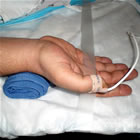|
Transradial Training
at ACC.11
Terumo and The Medicines
Company® Will Be Holding a Transradial Hands-On Learning
Lab at the Annual American College of Cardiology Meeting in New
Orleans
|
 |
 |
|
March 11, 2011 --
If you are an interventional cardiologist, performing angioplasty
and placing stents, and are attending this year's annual American
College of Cardiology meeting in
New Orleans, you should definitely think about attending the
Transradial Hands-On Learning Lab to find out
how to perform diagnostic caths and PCIs via the radial artery
in
the wrist,
instead of the standard femoral access site.
Why? Because, according to the published data, bleeding complications
are reduced by half, patient comfort is increased considerably
and costs are reduced in a number of ways. |
The radial approach is used extensively around
the world, but in the U.S. only 5-10%. However, this is growing as
more and more interventionalists realize the benefits afforded in
patient comfort and particularly in the reduction of bleeding complications.
Bleeding complications after PCI have been linked to increased mortality
in a number of studies. Reducing these complications is one way in
which interventionalists can improve patient outcomes. As Dr. Sameer
Mehta of the University of Miami Miller School of Medicine told Angioplasty.Org:
"I'm
convinced that the absolutely perfect combination for a
lot of
these
patients
is
going to be transradial procedures performed with bivalirudin.
You have the access site which reduces bleeding, as well as a drug
which
is known to reduce bleeding...".
The Hands-On Learning Lab is titled "Transradial
Access and Procedural Anticoagulation Therapies", and physicians
will partake in didactic training, to include tips and tricks, equipment
usage, pharmacology, and complex cases. Participants will practice
cases and learn access techniques with various transradial simulators.
In addition, they will learn about hemostasis techniques along with
procedural anticoagulation therapies.
The schedule for the lab is:
Sunday, April 3
9:30 a.m. – 11:00 a.m. Dr. Tak Kwan
11:00 a.m. – 12:30 p.m. Dr. Branavan
Umakanthan
1:30 p.m. – 3:00 p.m. Dr. Michael Liou
3:00 p.m. – 4:30 p.m. Dr. Tak Kwan
Monday, April 4
9:30 a.m. – 11:00 a.m. Dr. Sunil Rao
11:00 a.m. – 12:30 p.m. Dr. Michael Liou
1:30 p.m. – 3:00 p.m. Dr. Mauricio Cohen
3:00 p.m. – 4:30 p.m. Dr. Daniel Steinberg
Tuesday, April 5
9:30 a.m. – 11:00 a.m. Dr. Sunil Rao
11:00 a.m. – 12:30 p.m. Dr. Daniel Steinberg
You can register online for the workshop here.
In addition, the event's sponsors state that:
"This
event is not part of the official ACC Annual Scientific Session & Expo
and/or the American College of Cardiology's Innovation in
Inter vention: i2 Summit in
Partnership
with the Cardiovascular Research Foundation (CRF), as planned
by their Program Committees. This event does not qualify
for continuing
medical education (CME) credit."
Reported by Burt Cohen, March 11, 2011
|

